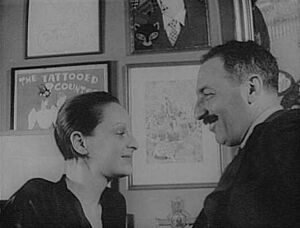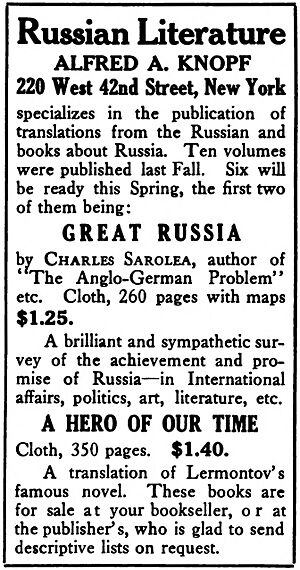Alfred A. Knopf facts for kids
 |
|
| Parent company | Penguin Random House |
|---|---|
| Founded | 1915 |
| Founder | Blanche Wolf Knopf and Alfred A. Knopf Sr. |
| Country of origin | United States |
| Headquarters location | New York City, U.S. |
Alfred A. Knopf, Inc. is a famous American company that publishes books. It was started by Blanche Knopf and Alfred A. Knopf Sr. in 1915. They were known for publishing books by writers from Europe, Asia, and Latin America. They also published many popular American authors.
In 1960, another company called Random House bought Knopf. Today, it's part of the Knopf Doubleday Publishing Group. This group is part of Penguin Random House, which is owned by a large German company called Bertelsmann.
Knopf is known for its special logo, which is a borzoi dog. A borzoi is a type of Russian wolfhound. Co-founder Blanche Knopf designed this logo in 1925. You can often see it on the first page of their books.
Contents
History of Knopf Publishing
How Knopf Started
Alfred A. Knopf, Inc. began in 1915. Alfred A. Knopf Sr. and Blanche Knopf started it together. Their first office was in the Candler Building in New York City. By 1918, the company was officially set up. Alfred was the president, and Blanche was the vice president.
From the very beginning, Knopf wanted to publish important books. They focused on translating books from Europe. Some of their first books were by French, Ukrainian, and Polish writers. During World War I, these books were inexpensive to get. This helped Knopf become known for publishing European works in America.
Their first big success was a new edition of Green Mansions. This novel by W. H. Hudson sold over 20,000 copies by 1919. Their first original American novel was The Three Black Pennys by Joseph Hergesheimer. It came out in 1917.
The 1920s: New Ideas
In the 1920s, Knopf started using new ways to advertise their books. In 1920, they made small booklets called The Borzoi. These booklets helped promote new books and authors.
For a novel called Moon-Calf, they even hired people to walk around New York City. These people wore costumes and carried signs with the book on them. This helped get people's attention and sent them to local bookstores.
The unique look of Knopf's books and their clever advertising attracted famous authors. Willa Cather, a well-known writer, joined Knopf. She published many books with them. Her novel One of Ours was Knopf's first book to win a Pulitzer Prize.
In 1923, Knopf also started publishing magazines. One of these was The American Mercury.
Also in 1923, Knopf published The Prophet by Kahlil Gibran. At first, it didn't sell many copies. But over time, it became one of their most successful books. It has been translated into over 100 languages. It has never stopped being printed by Knopf.
The 1930s and 1940s
Blanche Knopf became president of the company in 1957. Alfred Knopf became chairman. Blanche worked for the company until she passed away in 1966. Alfred Knopf retired in 1972.
After World War II, Blanche Knopf traveled to Europe and South America. She was one of the first publishers to visit Europe after the war. Her trips helped bring many new writers from around the world to Knopf.
The 1950s: New Talent
In 1957, an important editor named Judith Jones joined Knopf. She had discovered Anne Frank: Diary of a Young Girl at her previous job. At Knopf, she found and published Julia Child's famous cookbook, Mastering the Art of French Cooking. Judith Jones worked with many other great writers like John Updike and Anne Tyler. She retired in 2011.
Alfred and Blanche's son, Alfred "Pat" Jr., left the company in 1959. He started his own publishing company called Atheneum Books.
In 1957, Alfred A. Knopf shared his beliefs about publishing. He said he would "never publish an unworthy book." He also believed that "magazines, movies, television, and radio will never replace good books."
Knopf Joins Random House
In 1960, Random House bought Alfred A. Knopf. This happened after Alfred A. Knopf Jr. left to start his own company.
Knopf has always cared a lot about how their books look. They have worked with many famous designers. At the end of many Knopf books, there's a special page. It's called "A Note on the Type." This page explains the history of the font used in the book.
In 1991, Knopf brought back the "Everyman's Library" series. These are classic books from around the world. They are published in nice hardcover editions that people can afford. The series now includes Children's Classics and Pocket Poets.
In 1998, Bertelsmann AG bought Random House. Later, in 2008 and 2009, the Knopf Publishing Group joined with Doubleday. They formed the Knopf Doubleday Publishing Group.
In 2013, Random House joined with Penguin Group. This created a new company called Penguin Random House. This big merger helped them compete better in the book world. Many of Knopf's hardcover books are later published as Vintage paperbacks. Vintage Books is also part of Random House.
In 2015, Knopf celebrated its 100th birthday! They published a special book to mark the occasion.
Notable People at Knopf
Important Editors
Knopf has had many important editors. The main editors-in-chief have been Alfred A. Knopf, Sr., Robert Gottlieb, Sonny Mehta, and Jordan Pavlin. Other influential editors include Judith Jones (who worked on cookbooks) and Peter Mendelsund (who designed book covers).
Famous Authors
Alfred A. Knopf has published books by many famous authors. Here are just a few:
- Albert Camus
- Willa Cather
- Julia Child
- Michael Crichton
- Joan Didion
- Kahlil Gibran
- Kazuo Ishiguro
- John le Carré
- Gabriel García Márquez
- Cormac McCarthy
- Toni Morrison
- Alice Munro
- Haruki Murakami
- Christopher Paolini
- Anne Rice
- Donna Tartt
- Anne Tyler
- John Updike
Awards Won by Knopf Books
| Year | Award | Category | Title | Author |
|---|---|---|---|---|
| 2013 | Pulitzer Prize | Poetry | Stag's Leap | Sharon Olds |
| 2011 | Pulitzer Prize | Fiction | A Visit from the Goon Squad | Jennifer Egan |
| 2010 | Pulitzer Prize | Biography or Autobiography | The First Tycoon | T.J. Stiles |
| 2007 | Pulitzer Prize | Fiction | The Road | Cormac McCarthy |
| 2005 | MHA Best Book Award | History | Joseph Smith: Rough Stone Rolling | Richard Bushman |
| 2005 | Pulitzer Prize | Biography or Autobiography | de Kooning: An American Master | Mark Stevens and Annalyn Swan |
| 2004 | Pulitzer Prize | Poetry | Walking to Martha's Vineyard | Franz Wright |
| 2003 | Newbery Honor | Fiction | Hoot | Carl Hiaasen |
| 2003 | Pulitzer Prize | Biography or Autobiography | Master of the Senate | Robert A. Caro |
| 2002 | Pulitzer Prize | Fiction | Empire Falls | Richard Russo |
| 2001 | Pulitzer Prize | History | Founding Brothers | Joseph J. Ellis |
| 1999 | Pulitzer Prize | Poetry | Blizzard of One | Mark Strand |
| 1998 | Pulitzer Prize | Biography or Autobiography | Personal History | Katharine Graham |
| 1997 | Pulitzer Prize | History | Original Meanings | Jack N. Rakove |
| 1996 | Pulitzer Prize | Fiction | Independence Day | Richard Ford |
| 1996 | Pulitzer Prize | Biography or Autobiography | God: A Biography | Jack Miles |
| 1996 | Pulitzer Prize | History | William Cooper's Town | Alan Taylor |
| 1995 | Pulitzer Prize | Poetry | The Simple Truth | Philip Levine |
| 1995 | Pulitzer Prize | General Nonfiction | The Beak of the Finch | Jonathan Weiner |
| 1993 | Pulitzer Prize | History | The Radicalism of the American Revolution | Gordon S. Wood |
| 1992 | Pulitzer Prize | Fiction | A Thousand Acres | Jane Smiley |
| 1991 | Pulitzer Prize | History | A Midwife's Tale | Laurel Thatcher Ulrich |
| 1991 | Pulitzer Prize | Fiction | Rabbit at Rest | John Updike |
| 1991 | Pulitzer Prize | Poetry | Near Changes | Mona Van Duyn |
| 1989 | Pulitzer Prize | Biography or Autobiography | Oscar Wilde | Richard Ellmann |
| 1989 | Pulitzer Prize | Fiction | Breathing Lessons | Anne Tyler |
| 1988 | Pulitzer Prize | History | The Launching of Modern American Science, 1846-1876 | Robert V. Bruce |
| 1988 | Pulitzer Prize | History | Partial Accounts | William Meredith |
| 1988 | Pulitzer Prize | Fiction | Beloved | Toni Morrison |
| 1987 | Pulitzer Prize | History | Voyagers to the West | Bernard Bailyn |
| 1987 | Pulitzer Prize | Fiction | A Summons to Memphis | Peter Taylor |
| 1986 | Pulitzer Prize | Biography or Autobiography | Louise Bogan | Elizabeth Frank |
| 1986 | Pulitzer Prize | General Nonfiction | Common Ground | J. Anthony Lukas |
| 1982 | Pulitzer Prize | Fiction | Rabbit Is Rich | John Updike |
| 1981 | Pulitzer Prize | Biography or Autobiography | Peter the Great | Robert K. Massie |
| 1981 | Pulitzer Prize | General Nonfiction | Fin-de-Siècle Vienna | Carl E. Schorske |
| 1980 | Pulitzer Prize | History | Been In the Storm So Long | Leon F. Litwack |
| 1979 | Pulitzer Prize | Fiction | The Stories of John Cheever | John Cheever |
| 1975 | Pulitzer Prize | Biography or Autobiography | The Power Broker: Robert Moses and the Fall of New York | Robert A. Caro |
| 1973 | Pulitzer Prize | History | People of Paradox | Michael Kammen |
| 1970 | Pulitzer Prize | Biography or Autobiography | Huey Long | T. Harry Williams |
| 1967 | Pulitzer Prize | History | Exploration and Empire | William H. Goetzmann |
| 1965 | Pulitzer Prize | Fiction | The Keepers of the House | Shirley Ann Grau |
| 1964 | Pulitzer Prize | General Nonfiction | Anti-Intellectualism in American Life | Richard Hofstadter |
| 1962 | Pulitzer Prize | History | The Triumphant Empire: Thunder-Clouds Gather in the West | Lawrence H. Gipson |
| 1961 | Pulitzer Prize | Biography or Autobiography | Charles Sumner and the Coming of the Civil War | David Herbert |
| 1960 | Pulitzer Prize | Poetry | Heart's Needle | W. D. Snodgrass |
| 1956 | Pulitzer Prize | History | The Age of Reform | Richard Hofstadter |
| 1955 | Pulitzer Prize | History | Collected Poems: Wallace Stevens | Wallace Stevens |
| 1951 | Pulitzer Prize | Fiction | The Town | Conrad Richter |
| 1950 | Pulitzer Prize | Biography or Autobiography | John Quincy Adams and the Foundations of American Foreign Policy | Samuel Flagg Bemis |
| 1946 | Pulitzer Prize | Biography or Autobiography | Son of the Wilderness | Linnie Marsh Wolfe |
| 1945 | Pulitzer Prize | Novel | A Bell for Adano | John Hersey |
| 1945 | Pulitzer Prize | Biography or Autobiography | George Bancroft: Brahmin Rebel | Russel Blaine Nye |
| 1944 | Pulitzer Prize | Biography or Autobiography | The American Leonardo: A Life of Samuel F. B. Morse | Carleton Mabee |
| 1934 | Pulitzer Prize | Poetry | Collected Verse | Robert Hillyer |
| 1927 | Pulitzer Prize | Poetry | Fiddler's Farewell | Leonora Speyer |
| 1923 | Pulitzer Prize | Novel | One of Ours | Willa Cather |
| 2009 | National Book Award | Nonfiction | The First Tycoon | T.J. Stiles |
| 2005 | National Book Award | Nonfiction | The Year of Magical Thinking | Joan Didion |
| 2002 | National Book Award | Nonfiction | Master of the Senate | Robert A. Caro |
| 1997 | National Book Award | Nonfiction | American Sphinx The Character of Thomas Jefferson | Joseph J. Ellis |
| 1991 | National Book Award | Nonfiction | How We Die | Sherwin B. Nuland |
| 1992 | National Book Award | Fiction | All the Pretty Horses | Cormac McCarthy |
| 1991 | National Book Award | Poetry | What Work Is | Philip Levine |
| 1989 | National Book Award | Fiction | Spartina | John Casey |
| 1985 | National Book Award | Nonfiction | Common Ground | J. Anthony Lukas |
| 1983 | National Book Award | History | Voices of Protest | Alan Brinkley |
| 1982 | National Book Award | Fiction | Rabbit is Rich | John Updike |
| 1981 | National Book Award | First Novel | Sister Wolf | Ann Arensberg |
| 1981 | National Book Award | Fiction Paperback | The Stories of John Cheever | John Cheever |
| 1981 | National Book Award | General Nonfiction | China Men | Maxine Hong Kingston |
| 1981 | National Book Award | History Paperback | Been in the Storm So Long | Leon F. Litwack |
| 1980 | National Book Award | Autobiography (Hardcover) | By Myself | Lauren Bacall |
| 1980 | National Book Award | Current Interest (Hardcover) | Julia Child and More Company | Julia Child |
| 1980 | National Book Award | History (Paperback) | A Distant Mirror | Barbara W. Tuchman |
| 1980 | National Book Award | First Novel | Birdy | William Wharton |
| 1977 | National Book Award | Contemporary Thought | The Uses of Enchantment | Bruno Bettelheim |
| 1976 | National Book Award | Fiction | J R | William Gaddis |
| 1975 | National Book Award | Contemporary Affairs | All God's Dangers | Theodore Rosengarten |
| 1974 | National Book Award | Biography | Macaulay | John Clive |
| 1972 | National Book Award | Poetry | The Collected Works of Frank O'Hara | Frank O'Hara |
| 1970 | National Book Award | History and Biography | Huey Long | T. Harry Williams |
| 1967 | National Book Award | History and Biography | The Enlightenment, Vol. 1 | Peter Gay |
| 1964 | National Book Award | Fiction | The Centaur | John Updike |
| 1962 | National Book Award | Fiction | The Moviegoer | Walker Percy |
| 1961 | National Book Award | Fiction | The Waters of Kronos | Conrad Richter |
| 1955 | National Book Award | Poetry | The Collected Poems of Wallace Stevens | Wallace Stevens |
| 1951 | National Book Award | Poetry | The Auroras of Autumn | Wallace Stevens |
| 2017 | Nobel Prize | Literature | Nobel Prize in Literature | Kazuo Ishiguro |
| 2013 | Nobel Prize | Literature | Nobel Prize in Literature | Alice Munro |
| 2007 | Nobel Prize | Literature | Nobel Prize in Literature | Doris Lessing |
| 2006 | Nobel Prize | Literature | Nobel Prize in Literature | Orhan Pamuk |
| 2002 | Nobel Prize | Literature | Nobel Prize in Literature | Imre Kertész |
| 2001 | Nobel Prize | Literature | Nobel Prize in Literature | V.S. Naipaul |
| 1999 | Nobel Prize | Literature | Nobel Prize in Literature | Günter Grass |
| 1993 | Nobel Prize | Literature | Nobel Prize in Literature | Toni Morrison |
| 1991 | Nobel Prize | Literature | Nobel Prize in Literature | Nadine Gordimer |
| 1982 | Nobel Prize | Literature | Nobel Prize in Literature | Gabriel García Márquez |
| 1980 | Nobel Prize | Literature | Nobel Prize in Literature | Czeslaw Milosz |
| 1972 | Nobel Prize | Literature | Nobel Prize in Literature | Heinrich Boll |
| 1968 | Nobel Prize | Literature | Nobel Prize in Literature | Yasunari Kawabata |
| 1965 | Nobel Prize | Literature | Nobel Prize in Literature | Mikhail Sholokhov |
| 1964 | Nobel Prize | Literature | Nobel Prize in Literature | Jean-Paul Sartre (declined) |
| 1961 | Nobel Prize | Literature | Nobel Prize in Literature | Ivo Andric |
| 1957 | Nobel Prize | Literature | Nobel Prize in Literature | Albert Camus |
| 1955 | Nobel Prize | Literature | Nobel Prize in Literature | Halldor K. Laxness |
| 1947 | Nobel Prize | Literature | Nobel Prize in Literature | André Gide |
| 1944 | Nobel Prize | Literature | Nobel Prize in Literature | Johannes V. Jensen |
| 1939 | Nobel Prize | Literature | Nobel Prize in Literature | Frans E. Sillanpaa |
| 1929 | Nobel Prize | Literature | Nobel Prize in Literature | Thomas Mann |
| 1928 | Nobel Prize | Literature | Nobel Prize in Literature | Sigrid Undset |
| 1924 | Nobel Prize | Literature | Nobel Prize in Literature | Wladyslaw S. Reymont |
| 1920 | Nobel Prize | Literature | Nobel Prize in Literature | Knut Hamsun |
| 1916 | Nobel Prize | Literature | Nobel Prize in Literature | Verner von Heidenstam |
Logo
The logo for Knopf is a Russian wolfhound, also known as a Borzoi. Blanche Knopf thought the Borzoi would be a good logo because it looked like it was moving. This logo was used on the spine and the title page of their books.
See also
 In Spanish: Alfred A. Knopf para niños
In Spanish: Alfred A. Knopf para niños



